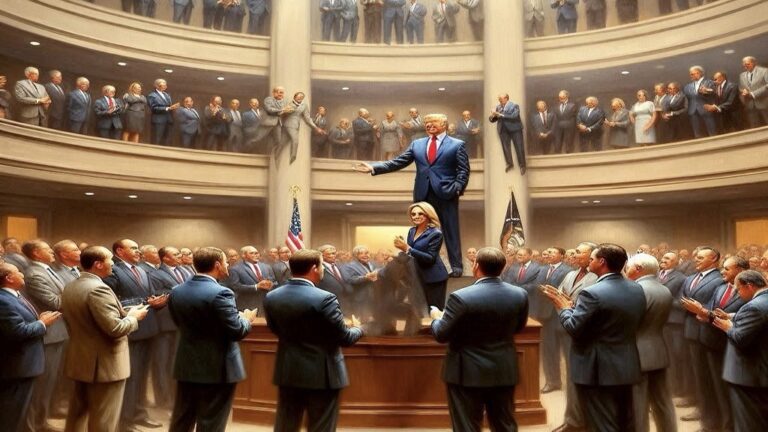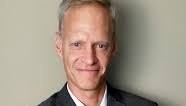President Donald Trump does not arrive at his decisions solely through his own wit and wisdom. Instead, he is guided, instructed, encouraged, and flattered by a cadre of advisors, strategists, and confidants who have played a pivotal role in shaping his economic stance. This inner circle—composed of business leaders, policy experts, political operatives, and media influencers—has steered him toward his current economic position, which reflects a mix of protectionist trade policies, tax cuts favoring corporations and the wealthy, deregulation of key industries, and a staunch commitment to America-first economic nationalism. Their influence is evident in the administration’s approach to tariffs, its restructuring of international trade agreements, and its prioritization of Wall Street-friendly policies, all of which have defined Trump’s economic legacy.
Money Talks. Does It Say the Right Words?
The 2024 U.S. presidential election was one of the most expensive in history, with total spending reaching approximately $15.9 billion, surpassing previous records. President Donald Trump’s campaign directly raised $382 million, with affiliated committees contributing an additional $694 million. Elon Musk, CEO of Tesla and SpaceX, emerged as a significant donor in the 2024 election cycle. He contributed approximately $193 million to his pro-Trump super PAC, America PAC, by Election Day, and an additional $20 million to a separate Trump-aligned PAC, totaling over $200 million in support of Trump’s campaign.
Timothy Mellon, heir to the Mellon banking dynasty, was another major contributor, donating $151.5 million to the pro-Trump super PAC, Make America Great Again Inc., through mid-October. Other prominent Republican donors included Richard Uihlein and his wife Elizabeth, who contributed $138 million to federal political groups supporting the 2024 elections, with $53 million directed to their super PAC, Restoration PAC. Miriam Adelson, widow of casino magnate Sheldon Adelson, donated $100 million to the pro-Trump Preserve America PAC. While these figures highlight the significant influence of megadonors in the 2024 election, the total spending did not reach the $20 billion mark as suggested. The reported total was approximately $15.9 billion.
Economic Advisors
As of April 2025, President Donald Trump’s economic and policy decisions are shaped by a team of advisors with diverse backgrounds in education, experience, expertise, and varying levels of wealth.
Kevin Hassett – Former Chair of the Council of Economic Advisors
Hassett has a Ph.D. in economics from the University of Pennsylvania. He was a key economic advisor during Trump’s first term and played a role in shaping tax and fiscal policy. With a Ph.D. in economics, Hassett ranks highly in academic credentials, though his influence is primarily within the realm of economic theory rather than practical policymaking at a global scale. His wealth comes mainly from his academic and advisory roles, but he doesn’t have the massive fortune seen with figures like Trump himself or others in the group
Larry Kudlow – Director of the National Economic Council
Kudlow graduated from the University of Rochester and received a master’s degree in economics from Princeton University. As the Director of the National Economic Council, he held significant sway in shaping Trump’s economic agenda. His role in media also gave him influence in public opinion. Kudlow’s education at Princeton is impressive, but he has been criticized for occasionally veering from mainstream economic thought, which has affected his standing among academic economists. He’s highly respected for his media presence and persuasive abilities but isn’t often considered the “most academically credentialed.” He has amassed a significant fortune, largely through his career in finance, media, and government.
Art Laffer – Economist, “Laffer Curve”
Laffer earned a Ph.D. in economics from the University of California, and his ideas revolutionized supply-side economics. His influence is immense in conservative economic circles, especially for advocating tax cuts and deregulation, which were central to Trump’s policies. Laffer is highly respected in the economics world, though his theories are often debated. He is well-known for his successful consulting business and his work as an author, which has earned him a significant fortune. His influence and wealth make him one of the more powerful economists associated with Trump’s policies.
Robert Lighthizer – Former U.S. Trade Representative
Lighthizer has a law degree from Georgetown University and a master’s degree in international law from the University of Oxford. He is a successful lawyer and former partner in major law firms, suggesting significant wealth, though he’s not as wealthy as some others in this group. As the U.S. Trade Representative, Lighthizer held considerable power in shaping U.S. trade policy, especially in the high-profile trade negotiations with China and the renegotiation of NAFTA into the USMCA. Lighthizer’s academic pedigree from Georgetown and Oxford is impressive, and his expertise in international trade is highly respected.
Howard Lutnick – Secretary of Commerce
Lutnick holds a Bachelor’s degree in economics from Claremont McKenna College. He joined Cantor Fitzgerald in 1983, becoming CEO in 1991 and directed the firm’s recovery after the 9/11 attacks. He is noted for his background in financial services, market dynamics, and international trade. It is estimated that his net worth is approximately $2 billion.
Stephen Moore – Economist, Trump Advisor
Moore completed his Bachelor of Arts at the University of Illinois at Urbana-Champaign and earned a Master of Arts in economics from George Mason University. Moore co-founded and served as president of the Club for Growth from 1999 to 2004. He was a member of The Wall Street Journal’s editorial board and has been affiliated with The Heritage Foundation as a senior fellow. Moore also advised Herman Cain’s 2012 presidential campaign and Donald Trump’s 2016 presidential campaign.
Moore specializes in economic policy, with a focus on taxation and supply-side economics. He has authored several books, including Trumponomics: Inside the America First Plan to Revive Our Economy, co-authored with Arthur B. Laffer.
While exact figures are not publicly available, Moore has had financial challenges. In 2012, a Virginia court held him in contempt for failing to pay over $300,000 in spousal and child support. Additionally, in 2018, the IRS obtained a tax lien against him for $75,328 in unpaid federal taxes, which he attributed to an accountant’s error.
Elon Musk – Special Government Employee, Department of Government Efficiency
Musk attended Queen’s University in Canada; transferred to the University of Pennsylvania, earning a bachelor’s degrees in physics and economics. He is the Founder and CEO of multiple companies, including Tesla, SpaceX, and xAI. He is noted for his innovation, technology, and efficiency improvements across various industries. As of early 2025, his estimated net worth is $316 billion, though he experienced significant losses in the first quarter due to declines in Tesla’s stock performance.
Peter Navarro – Senior Counselor for Trade and Manufacturing
Navarro earned his Bachelor of Arts degree from Tufts University; Master of Public Administration and Ph.D. in economics from Harvard University. He has over 20 years’ experience as a professor of economics and public policy at the University of California-Irvine. Navarro served as Assistant to the President and Director of the Office of Trade and Manufacturing Policy during Trump’s previous administration. He is cited as an expert in trade policy, particularly concerning China, and economic strategies to bolster domestic manufacturing. His ideological leanings on trade have been very influential in shaping Trump’s protectionist stance. His estimated net worth is approximately $6 million.
Judy Shelton – Senior Fellow at the Independent Institute
Shelton earned a Bachelor of Science in business from Portland State University and both an MBA and a Ph.D. in business administration from the University of Utah. Shelton has held several significant positions, including serving as a Senior Fellow at the Independent Institute and as the U.S. Director of the European Bank for Reconstruction and Development. She was also the Chair of the National Endowment for Democracy. Shelton was nominated by President Donald Trump nominated her for a position on the Federal Reserve Board, though her nomination was not confirmed. She is recognized for her work in monetary policy and international finance and has been a proponent of returning to the gold standard and critical of the Federal Reserve’s policies. Her publications include Money Meltdown: Restoring Order to the Global Currency System and The Coming Soviet Crash: Gorbachev’s Desperate Pursuit of Credit in Western Financial Markets.
In terms of influence, Larry Kudlow and Peter Navarro stand out for their direct impact on economic and trade policies. Art Laffer also holds considerable sway in shaping supply-side tax strategies.
Peter Navarro has emphasized the critical role of trade policy in shaping America’s economic future. He stated, “The Donald Trump trade doctrine is this: America will trade with any country, so long as that deal meets these three criteria: You increase the GDP growth rate, you decrease the trade deficit, and you strengthen the manufacturing base”. This underscores his focus on leveraging trade policy to bolster domestic industries and reduce economic imbalances.



![The Intersection of Wine and War: Owning a Winery in Israel’s Toughest Times [Part-2]](https://inmypersonalopinion.life/wp-content/uploads/2024/12/FE.jpg)

